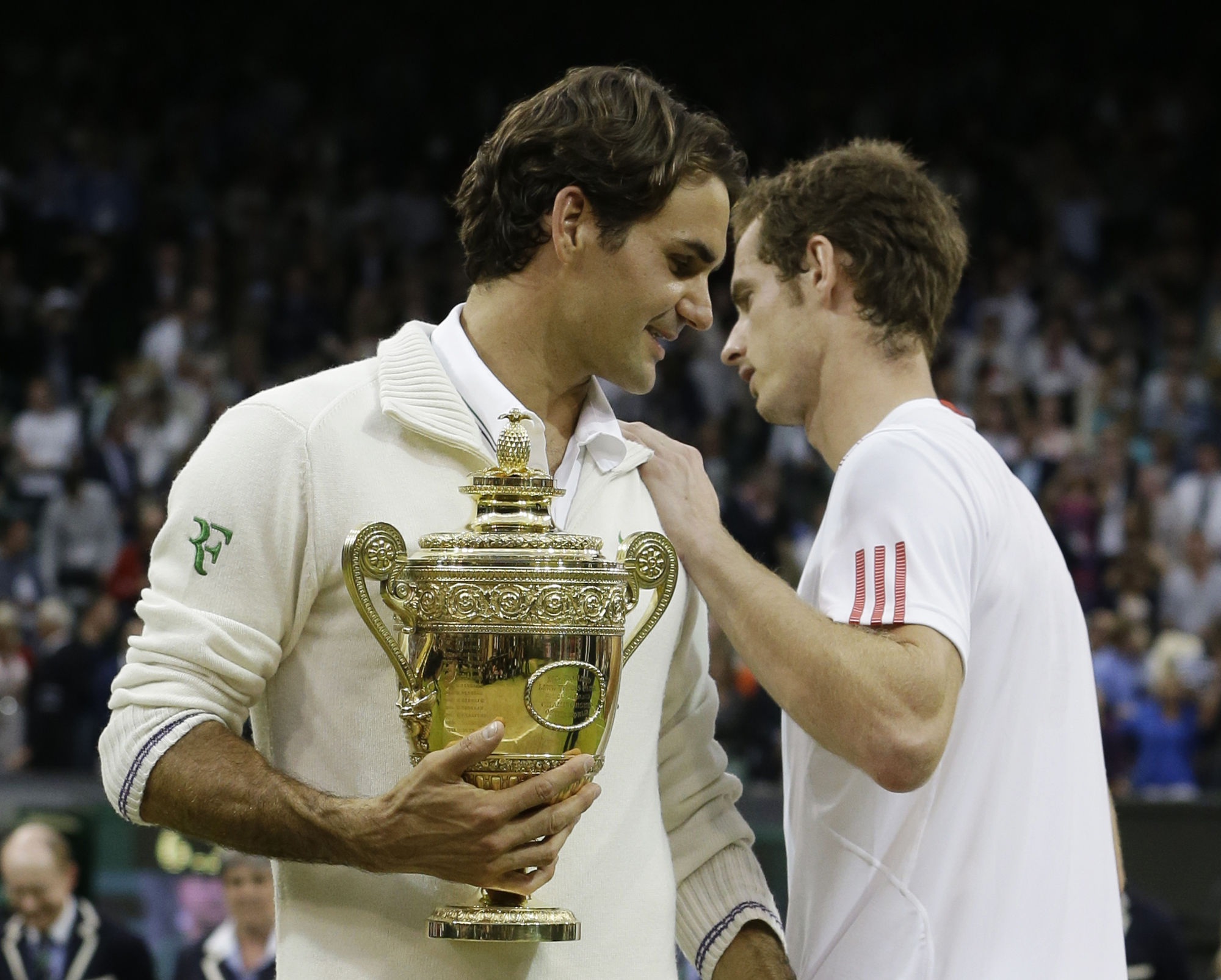The hurt was contagious, the disappointment overwhelming.
The regal Roger Federer may have been the opponent, but this was supposed to be Andy Murray's moment, his first Grand Slam tennis title about to be won in his fourth major final, the hallowed grounds of Wimbledon all dressed up to deliver the Dunblane, Scotland, native's appropriate breakthrough triumph.
Heck, the stars were so lined up for Murray to deliver Great Britain its first gentleman's singles championship since Fred Perry in 1936 that a fellow Brit -- Bradley Wiggins -- had taken the overall lead following the seventh leg of the Tour de France on Saturday, becoming just the fifth Brit in history to wear the yellow jersey.
Even Prime Minister David Cameron, Prince William's wife, Kate, and her sister, Pippa Middleton, were in the house, though it's doubtful they had to cough up the reported scalper's price of 25,000 pounds for the privilege.
It was all so big and hopeful and glorious that one London sports writer told ESPN that a Murray win would become the biggest sports moment in jolly, old England since it posted a 4-2 victory over Germany in the 1966 World Cup final. And we all know how they love their soccer over their across the pond.
And Murray certainly didn't disappoint early on, winning Sunday's opening set in this best-of-five-set format. Then he had barely lost the second, neither his guts nor his guile failing him as much as his forehand.
But then the cruelest of ironies struck the All-England Club. The rain came and the high-tech retractable roof above Centre Court closed. The 25-year-old Murray may be of the Twitter-Facebook-iPod generation, in constant embrace of the newest gadgetry, but this bit of wizardry mostly benefited his older, historically significant opponent.
Seeming to turn back time to those days when he first earned the moniker GOAT (greatest of all time), Federer famously flashed all the weapons that won him his record 16 Grand Slam titles before this fortnight, though none since early 2010.
Displaying a serve with more facets than his homeland's Swiss army knife, a fiery forehand, a bold backhand and a devilish, devious drop shot, Fed won the third set, then the fourth to claim his 17th major, tie his hero Pete Sampras and William Renshaw for the most Wimbledon titles (7) and vault back to No. 1 in the world rankings for the first time since 2010.
This despite a stadium deliriously chanting "An-deeee, An-deeee, Andeee," throughout the final frame, as hostile a crowd as the universally beloved Federer has ever faced.
All of which meant the morose Murray was suddenly forced to utter a few words into the microphone as the good-sport runner-up, a task nearly as tough at that moment as facing Federer.
Said Murray, his lips quivering, "He's not bad for a 30-year-old."
And he's not. In fact, for all of us (blush, blush) who wrote such panicky paragraphs as "I hope Roger Federer wins another major or two before he retires. I hope so, but I'll no longer expect it after Wednesday's stunning loss to Jo-Wilfried Tsonga in the Wimbledon quarterfinals. And neither should you," this was crow under glass.
That was last year, by the way. This year? Well, let's just say that there is no greater compliment to anyone than he constantly strives to improve.
Asked Sunday if he was better than five years ago, when he was winning everything on the planet, Federer said, "I hope so. You don't want to be worse five years later. I decided in the bigger matches to take it more to my opponent instead of waiting a bit more for mistakes ... how you want to win Wimbledon is by going for your shots."
But Murray also went for his shots. He played arguably the best match of his career under the most stress he has ever faced on a tennis court. But it was hardly the worst stress of his life.
His parents's divorce was bad enough. But in 1996 Murray lived through one of the most disturbing mass murders in world history, his Dunblane Primary School riddled by a madman's bullets, 17 people -- mostly his young classmates -- killed before the gunman committed suicide.
As Murray kept winning at Wimbledon these past two weeks, he pointed to the heavens after each victory. He refused to say what the gesture meant, but it would not be surprising if he were pointing to those whose lives were lost 16 years ago.
Certainly Federer is fairly back where he should be, the most complete player in history once more completely in control of his game.
But as my wife watched Murray struggle to speak, his eyes watery and his voice shaking, she said, "I'm happy for Federer, but I want Murray to win it next year."
She'll surely be far from the only one.

